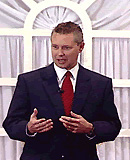 |
 |
07.27.07

Remarkable Leadership: The Kevin Eikenberry Interview Part 3
THIS IS the final post of our interview with Kevin Eikenberry author of the book Remarkable Leadership. Kevin Eikenberry maintains a blog on his web site. LeadingBlog: One thing that gets bantered around a lot today is the idea of the leaderless organization. Do you think that there is such a thing?  LB: I would agree with you completely. I don't think there is such a thing as a leaderless organization in that there is nobody at any given point at the helm. It may be shared, but that there’s nobody in that role, no. KE: Remarkable Leadership isn't even out yet as we're talking now, but I'm already working on what the next book is going to be and that is Remarkable Followership. It’s that role we play as followers. If all of us are leaders then all of us are also followers. And what does it look like as a job title or whatever? How do we still be a highly productive, engaged part of the team? LB: I think that’s really important. That’s one area that I don't think people understand — even people in leadership training — because they get the idea that I'm a leader and so I'm not a follower. Either, or. But throughout the day, sometimes I'm a leader and sometimes I'm a follower. It changes depending on the situation. A good leader knows when to follow. KE: Yes. Let’s just take the microcosm of a meeting. Within a meeting, a remarkable leader, a good leader, is going to be a leader and a follower over and over and over throughout that meeting – or maybe neither and be a facilitator (neutral). So, it’s really about role and understanding that all of us have to lead and follow. If everyone is leading and no one is following then there’s really no leader either. There’s the need for both roles and I think in reality for us to be truly highly functioning professionals, we need to master both of those roles. LB: Absolutely. Finally, what do you think is the biggest factor that prevents someone from becoming a remarkable leader? KE: Oh, to me that’s easy. The biggest factor that prevents it is belief. People don't think it’s possible: “I'm not a leader.” “Someone else is good at that, that’s not me.” “That’s not the thing that I'm good at.” “I don't see myself as that.” “My Dad wasn't a leader so I can't be a leader.” It’s not about potential, it’s not about possibility – yes, there are opportunities, there are development situations where some people have had great mentors and great opportunities and that sort of thing, but in the end, even if you have been given the opportunity to work with a great leader or have a great mentor or have had an amazingly fortunate opportunity, I believe, if you don't believe it’s possible for you to become that, it’s not going to happen. You're not going to see the opportunity. You're not going to take it. So to me the number one factor is belief.
Posted by Michael McKinney at 12:23 AM
|
BUILD YOUR KNOWLEDGE
 

How to Do Your Start-Up Right STRAIGHT TALK FOR START-UPS 
Grow Your Leadership Skills NEW AND UPCOMING LEADERSHIP BOOKS 
Leadership Minute BITE-SIZE CONCEPTS YOU CAN CHEW ON 
Classic Leadership Books BOOKS TO READ BEFORE YOU LEAD |